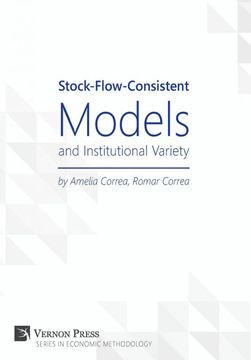Share
Stock-Flow-Consistent Models and Institutional Variety
Amelia Correa (Author)
·
Vernon Press
· Hardcover
Stock-Flow-Consistent Models and Institutional Variety - Amelia Correa
Choose the list to add your product or create one New List
✓ Product added successfully to the Wishlist.
Go to My Wishlists
Origin: U.S.A.
(Import costs included in the price)
It will be shipped from our warehouse between
Monday, July 15 and
Monday, July 22.
You will receive it anywhere in United Kingdom between 1 and 3 business days after shipment.
Synopsis "Stock-Flow-Consistent Models and Institutional Variety"
Methodology usually irritates economists. They prefer to get on with the job and do structural economics. The term always means general equilibrium. The story is told of consumers and producers making choices about consumption, work, investment, and so on. The grand finale is clearing of all markets. The plot is essentially devoid of money and banking. The language, though, is flexible enough to incorporate these elements and post-financial crisis, the best minds have been hard at work stretching the script in order to do so. We, on the other hand, hark back to another approach to structure that regards the economy as a whole as a set of interrelated real and monetary circuits. The principles at work are both logical (balance-sheet accounting) and historical (the economy in thrall to the rhythms of the cycle) and empirical (connections with national income statistics). We deal with identities. Consequently, they are incontrovertible. The relationships are connected by so-called stock-flow norms. These numbers can vary over time and space. Their uses are varied and will include ranges that they must fall within to ensure the stability of certain difference equation representations of our economies. In contrast, the community is used to norms imported or imposed from Basel or the IMF. Despite the popular connotations of the term 'accounting', the approach is fecund for proposing novel institutional practices to be transplanted into modern economies for welfare-maximizing ends. Their force is their origins in arithmetic. General equilibrium (anti-general equilibrium) tends to be strong on technique (critique) but weak when it comes to recommending non-trivial policy. Finally, most macroeconomists tend to think in closed-economy terms, the 'foreign' being the mirror of 'home'. What might be the connections between two institutionally varied economies that are thrown together by the dynamics of globalization?
- 0% (0)
- 0% (0)
- 0% (0)
- 0% (0)
- 0% (0)
All books in our catalog are Original.
The book is written in English.
The binding of this edition is Hardcover.
✓ Producto agregado correctamente al carro, Ir a Pagar.

